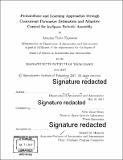| dc.contributor.advisor | Alvar Saenz-Otero. | en_US |
| dc.contributor.author | Terán Espinoza, Antonio | en_US |
| dc.contributor.other | Massachusetts Institute of Technology. Department of Aeronautics and Astronautics. | en_US |
| dc.date.accessioned | 2017-12-05T19:14:42Z | |
| dc.date.available | 2017-12-05T19:14:42Z | |
| dc.date.copyright | 2017 | en_US |
| dc.date.issued | 2017 | en_US |
| dc.identifier.uri | http://hdl.handle.net/1721.1/112480 | |
| dc.description | Thesis: S.M., Massachusetts Institute of Technology, Department of Aeronautics and Astronautics, 2017. | en_US |
| dc.description | Cataloged from PDF version of thesis. | en_US |
| dc.description | Includes bibliographical references (pages 143-148). | en_US |
| dc.description.abstract | Autonomous and multi-agent space operations within the context of in-space robotic servicing, assembly, and debris removal have received particular attention from both research and industry communities. The presence of uncertainties and unknown system parameters amongst these missions is prevalent, as they primarily deal with unknown or uncooperative target objects, e.g., asteroids or unresponsive, unsupervised tumbling spacecraft. To lower the inherent risk associated with these types of operations, possessing an accurate knowledge of the aforementioned characteristics is essential. In order to achieve this, approaches that employ a unified framework between parameter estimation and learning methodologies through a Composite Adaptation (CA) structure are presented. Furthermore, to evaluate the likelihood of mission success or objective completion, a probabilistic approach upon the system's operations is introduced; by employing probability distributions to model the control system's response and pairing these with the analysis of objectives' requirements and agents' characteristics, the calculation of on-board feasibility and performance assessments is presented. A formulation for the estimator and the controllers is developed, and results for the adaptive approach are demonstrated through hardware implementation using MIT's Synchronized Position Hold Engage Reorient Experimental Satellites (SPHERES) ground testing facilities. On-orbit test session data is analyzed, and further improvements upon the initial learning approach are verified through simulations. | en_US |
| dc.description.statementofresponsibility | by Antonio Terán Espinoza. | en_US |
| dc.format.extent | 148 pages | en_US |
| dc.language.iso | eng | en_US |
| dc.publisher | Massachusetts Institute of Technology | en_US |
| dc.rights | MIT theses are protected by copyright. They may be viewed, downloaded, or printed from this source but further reproduction or distribution in any format is prohibited without written permission. | en_US |
| dc.rights.uri | http://dspace.mit.edu/handle/1721.1/7582 | en_US |
| dc.subject | Aeronautics and Astronautics. | en_US |
| dc.title | Probabilistic and learning approaches through concurrent parameter estimation and adaptive control for in-space robotic assembly | en_US |
| dc.type | Thesis | en_US |
| dc.description.degree | S.M. | en_US |
| dc.contributor.department | Massachusetts Institute of Technology. Department of Aeronautics and Astronautics | |
| dc.identifier.oclc | 1011358354 | en_US |
